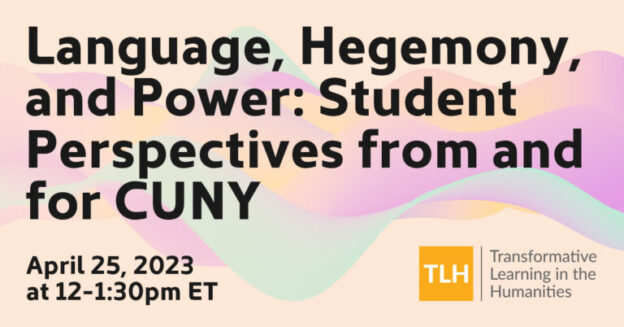Our virtual panel was designed as a safe space for students across CUNY to share their experiences using language in their academic careers. Students reflected on the languages they speak and blend together, what the expectations for expression and communication are in the classroom setting, and how they navigate linguistic standards that may or may not apply to them.
Students also shared ideas on how to support and embrace linguistic diversity and creativity with language among CUNY students. A question which sparked debate was that of ‘standard’ English: is it really a pertinent concept, and why? While students expressed their respect for such a concept – in appropriate contexts – they also called for more respect of their linguistic diversity and their own ‘Englishes,’ in light of Jamila Lyiscott poem ‘3 ways to speak English’.
Our two padlets revealed that our CUNY students not only are multilingual (we prefer the acronym MLL, Multi-Lingual Learner, to ESL, English as a Second Language), but that they are also speakers of numerous dialects which inform their own ways to speak English. The linguistic versatility of our students was reflected in their endless ideas on how to say a simple ‘hello.’
It was wonderful to see student after student raising their Zoom hands to answer questions about language and identity, community, education, hegemony, and power. Our student moderators, Ime Ekpo (BMCC) and Emily Pegoda (BMCC), did a great job at bringing the discussion together. Our panelists, Christina Caruso, Christopher Happe, Tennell Jones, Derek Keire, Carlene Nelson, and Yanica (Skyler) Williams, from BMCC, and Matthew Murillo, Daniel Yusupov, and Nicole Zara, from Queensborough Community College, gave us invaluable insight into student experience of language perception in both academic and non-academic contexts. One panelist shared a passionate account of their feelings of exclusion when a teacher would correct them on a simple request to go to the bathroom (‘May I’ not ‘Can I’, was the student corrected). But if our panel taught us one thing, it is that students indeed feel that they have to ask permission to be themselves and speak their own language, and so they are correct in using the modal verb ‘can’, when we should be teaching them in a way that gives them confidence to be themselves without asking ‘Can I’.
The students made it clear: multilingualism is richness. Language is a meeting place for people. It can include and exclude, make communities intimate and individuals connected or disconnected. We are teachers of language, writing, journalism, literature, and anthropology, and we organized this panel to hear the voices of our students and transform our approach to the humanities. Inclusivity is a value, but it is also a constant choice to use, teach, and welcome language that includes rather than excludes. For the future, we hope to carry this awareness with us and share it with others. We are very grateful to our students for their invaluable input, the TLH initiative for giving us the opportunity to organize this panel, and all attendees for providing us with an audience.
Cassandra R. Barnes (Guttman Community College)
Melissa Dennihy (Queensborough Community College)
Manon Hakem-Lemaire (Baruch College)
Laurie Lomask (Borough of Manhattan Community College)
Syreeta McFadden (Borough of Manhattan Community College)
TLH Faculty Fellows 2023


